#critical meta
Text
Aang's problem is that he doesn't live in the world of the hundred years' war. His conflicts aren't related to war, they are more local. Basic example: he needs to defeat the Fire Lord to stop the war. As if it depends on the actions of one dude, and hasn't been the usual routine of the whole world for a hundred fucking years.
All the villages that Aang visits in his episodes in Book 1 are as far from the given realities as possible: “The Great Divide”, “The FortuneTeller”, “The Winter Solstice (two parts)”. All problems are local, and most importantly, there's no war there.
All people there live as if it hasn't yet overtaken them and everything is fine. Yes, there's many episodes showing the problems of war, but they're focused on Sokka, Katara and Zuko.
Especially Zuko, because he's the one who faces the consequences of his people's ambitions, where the world is dying of exhaustion. Aang never faces this exhaustion; rather, he observes from the sidelines in the episodes of his friends (unless other characters point out the consequences of the war themselves, like in "The Storm" or "The Avatar State". But he never interacts with war victims on his own initiative). The only time he took part in military operations was at the North Pole, where he destroyed ships. But that's all, otherwise it's as abstract as possible. Even during the invasion in Book 3 he doesn't participate in the battle and only has to defeat one dude, meh
And since he's the main character of the story, there's the most such abstract episodes, at least in Book 1. This creates the feeling that the war lasts not a hundred years, but about five.
Indeed, if the war had just begun, many things would make sense. Why, among the many victims of war, is only one person blaming the avatar for his disappearance? Because the war has just begun and people haven't yet lost hope. Why do many cities on the border with the FN still have comfortable living conditions? Because the war has just begun, the enemies haven't yet had time to destroy their settlements. Why does ending the war depend specifically on defeating the Fire Lord, and not on careful, painstaking work on mentality and diplomacy? Because the war was the initiative of only one person and didn't have time to influence the minds of generations. That is, if you change Ozai to Sozin, the avatar's mission for the entire series will become logical.
But here's why Aang is bad as the main character: it only works when the world adapts to his actions, mentality and conflicts. He needs to save the weak and defenseless Katara in order to at least somehow invest himself in their relationship and give her something as a partner. Katara needs to expose herself to fire and forget that she's a waterbender to provoke Aang's guilt. The world has to create a lot of deus ex machina for Aang to actually reach the end and defeat the Fire Lord (the avatar state itself, Katara's spiritual water, lion-turtle). He has to pretend the world isn't in agony in order for his shallow mission to take down one dude to have any weight.
Moreover, the further the other characters are from Aang, the more alive they become.
Why is Zuko's arc so good? Because it exists separately from Aang and reveals the character on his terms. Why are episodes centered on Katara and Sokka good? Because they throw Aang into the background and reveal the realities of the world as they are.
That's why I don't believe in him, no matter what conflicts he has. After all, no matter what he feels, it all exists separately from the world in which he lives. And for him to start working as a character, he has to adjust the environment to suit himself, which creates a feeling of theatricality and decorativeness
191 notes
·
View notes
Text
OK, but I love that Essek might be appearing in the Mighty Nein series before he meets the Nein! It's not just me wanting More Essek (though I do) or wanting to see more of what was going on with his dealings with the Assembly (which I also do). I think this could be super fucking interesting from a narrative construction standpoint.
Because I cannot see how you can include Essek from early in the series and not make it clear to the audience that he's the Dynasty traitor loooong before the Nein find out. Essek having stolen the beacons will not be a surprise. It looks to me like the cast are swapping out surprise for a fuckton of suspense. (Suspense vs surprise was explained to me when I was studying narrative structure as 'surprise is when a bomb goes off that the audience didn't know was there. Suspense is when they see the bomb being placed and have to sit there begging the characters to realise it's there.' In this analogy, Essek is the bomb.)
When we watched C2, the question was is Essek the traitor? In the M9 show, the question for new watchers will be when will the Nein realise that Essek is the traitor? When Essek meets the Nein, the countdown starts ticking; people will know that he is a danger. He is manipulating them. He is going to hurt them. Will the Nein realise before it's too late? But then Essek starts really befriending them, showing more of his loneliness and vulnerability, and... I think the mood will shift. Oh, shit, he really cares about them, doesn't he? What will the Nein do if they find out? Do I even want them to find out? What if they reject him and it makes him worse? He can't keep this up much longer, this is unbearable, they're going to find out - OH FUCK THEY'RE FINDING OUT -
It's such a fascinating choice and I think it goes to show that adaptation is an art form in itself! The actual events in the world will be the same, or at least very similar, but a new format means you can show those events in a totally new way and create a completely different tone! Narrative structure is the fucking coolest! I'm so excited for this show!
#critical role#cr2 spoilers#mighty nein show#essek thelyss#sorry the narratology nerd in me is jumping out#my cr meta#(him being introduced early is by no means certain but it might be the case! so forgive me I must gush)
2K notes
·
View notes
Text
So lemme get this straight, they make a game called Baldur’s Gate 3, give us a companion who’s the son of a Council of Four Duke of the city of Baldur’s Gate and then underwrite him and neglect his character so badly that he’s hardly a companion at this point.
Larian, yall re-wrote Wyll, if y’all couldn’t handle story implications of having a character like this, y’all shouldn’t have went this direction. Wyll’s questline being as bad as it is should make the game lose an entire point. Idgaf. Wyll’s questline should be the one that’s most important.
This is like having a game named after NYC, having a companion being the son of a mayor and police chief, and that plot line and character playing almost zero role in the overall story.
This shit really is shameful
#wyll ravengard#bg3 wyll#wyll#bg3#baldurs gate 3#baldur's gate 3#baldur's gate iii#bg3 meta#bg3 critical#larian critical
2K notes
·
View notes
Text
Disney doesn't need to change "the formula." That's the last thing that Wish proves.
What Wish proves is that "the formula" only works when you know why the ingredients are in it, and you use them the correct way.
The Princess Character is meant to wish for only half of the movie's message, and go through an adventure that teaches her what the other half is; what her dream was missing. Ariel dreamed of understanding but she was missing love. Tiana dreamed of achieving her goals but she was missing faith. Jasmine dreamed of freedom but she was missing trust. Belle dreamed of adventure but she was missing being understood.
The Villain is meant to highlight the opposite of the movie's message. Jafar gets what he wants through trickery and manipulation; that's the opposite of Aladdin's "truth will set you free" message, and he gets imprisoned in a lamp. Scar thinks being a King is having his way all the time and can't learn from his past of living in Mufasa's shadow; that's the opposite of The Lion King's "Let the past remind you of your responsibility to selflessness." Gaston loves only himself and is always obsessed with appearances; that's the opposite of Beauty & the Beast's "true love is found within a heart of self-sacrifice." That's what makes them such good villains. (and that clear direction is what drives good villain songs, since Magnifico's is what everyone is talking about)
The sidekick is supposed to compare/contrast with the main character's qualities. Abu is a greedy thief, which is what everyone in Agrabah thinks Aladdin is; when he scolds Abu and teaches him selflessness, it shows us who Aladdin actually is. Flounder is easily frightened and looks at the glass half-full; when Ariel coaxes him and leads by example, we see her bravery and positivity reflected in Flounder's tiny character arc. Timon & Pumbaa do whatever they want all day just like young Simba always dreamed of; when Simba goes to live with them, he finds that "getting his way all the time" makes him forget who he really is and feel empty.
The setting is supposed to show off the characters and highlight the movie's message. Rapunzel's tower is designed to be pretty on the inside because of her influence; if it were too dark and prison-shaped, we'd wonder why she didn't work up the courage to leave sooner. Just like how Quasimodo has made his corner of the bell-tower beautiful, too; they're taught the world is cruel and they're not strong enough for it, but they make their own worlds beautiful enough to hint that that's wrong right from the start. Ariel's grotto is shaped like a tower with no roof so that she only has one window to the forbidden Surface, and it's the light that comes from that forbidden world into her dark grotto which literally makes her able to see human things differently. Tiana's apartment has no interesting features except her father's picture, a perfectly made bed, a drawer with no extra outfits but stuffed with tip money, and only two dresses; both of which are for work.
None of that is happening in Wish, because they didn't know why the formula ingredients are there. Disney needs to understand and return to the formula the right way; forgetting it was what got them here.
Asha learns nothing to add to her dream, unless you count "the power to grant wishes is in me." Which you shouldn't, because we didn't even know she was confused about that until the animals sang a song that was completely off-topic and she had the chance to jump in and sing "I'm a Star!"
Magnifico does not demonstrate the opposite of Wish's message effectively because his character has nothing to do with a philosophy against making wishes, and everything to do with power. (He is the strongest character in the film. But because the message and core concept of what wishes are are so bad, that's not saying much.)
Valentino, and Asha's friends, do not highlight anything about her character through compare/contrast. Valentino is brave and all over the place. Her friends are seven-dwarfs parodies. Happy, Doc, Sneezy, Dopey, Bashful, Sleepy, Grumpy. None of that contrasts with Asha's vague characterization of "cares too much." None of it compares to that characterization, either.
The setting is empty. There are no interesting details that teach you something about any of the characters. None in Asha's home, none in the neat-and-tidy one-dimensional forest, none in the Rosas square, and none in the bland, empty castle. Magnifico's study is the closest anything gets; there's a loose concept that all of Asha's friends have to work together to open the roof, and take a leap of faith to weigh the pulley system down. Unfortunately, none of these characters is shown struggling to work together, OR to take leaps of faith, at all, before this point.
The ingredients of the formula are in Wish. They're just not being used correctly. This is how not to use the formula; it's not the formulas fault. If it ain't broke. They should never have let people convince them to try and fix it.
#Disney#critic#wish#wish 2023#wish hate#Disney's wish#Disney criticism#wish Disney#get it together Disney#real Disney#realdisney#notmydisney#Mulan#Tangled#The Little Mermaid#The Lion King#Aladdin#Meta#writing#writing advice#Disney princesses#Princess critiques#the Disney formula#formula#character analysis#animation#set design#Rosas#Magnifico#Asha
2K notes
·
View notes
Text
so i was looking up datamined content from early access and wanted to rant and talk about some of the changes
Ketheric and Shar
His story was changed twice!in both ea version he was a moon elf chosen of shar(he had nothing to do with Myrkul),in the first version Halsin accidentally killed Isobel and that pushed ketheric to release the shadow curse, nightsong was an avatar of shar

this is the original nightsong,a necromancer called "sevryn"(beta version of balthazar?!) had quest for the player to kill her with a dagger that absorbed her power,but if you saved her she could become a camp follower,here's some of her lines
"Shar is the Nightsinger, and I am her Nightsong."
"I am her instrument, transforming the faithful into Shadows."
"I drink their sorrow, their loss, their grief,then I vomit it back into the world."
"I was captured, by Ketheric Thorm - Shar's chosen.He turned me into this creature."
"I want to sing my own song, not Shar's, not Ketheric's!"
you can listen to her datamined voice lines here and here's a video about that version
in the second version Ketheric turned away from Selûne when Isobel was still alive
in that version it was Balthazar who killed isobel then framed Aylin as her murderer
there was this isobel's line "I was dead, Aylin. For so long. It was Balthazar - he trapped my soul, he-"
and Aylin's line "It is why I couldn't leave your body, even when they came. Balthazar and that Sharran witch told your father that I was to blame."
and one Ketheric's line @ Aylin"You killed my daughter, then you stand before me and lie? I'll see you suffer tenfold what my Isobel did."(source)
i think being recruitable kinda make sense for this version of Ketheric because he was being manipulated by Balthazar and Shar
btw here's ketheric and isobel's datamined models(source)
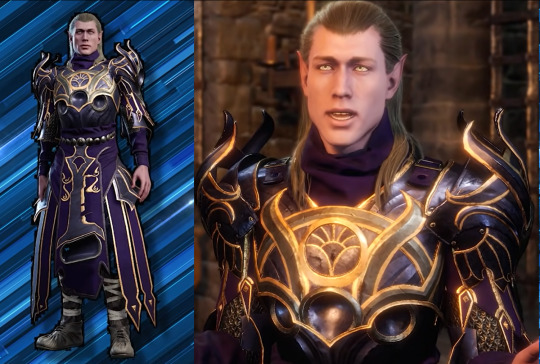
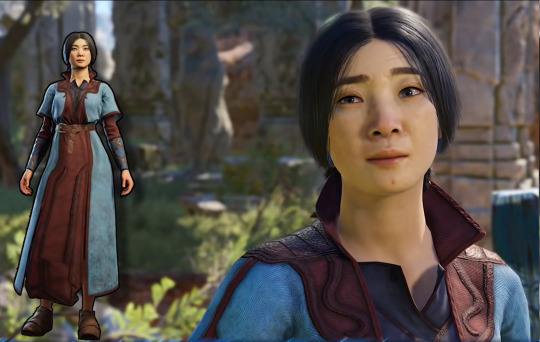
so act 2 was all about the conflict between Selune and Shar and they just slapped myrkul in there last minute?!
so Ketheric being a sharran and a chosen of absolute means shar was somehow supposed to involved with the absolute plot(that why shadowheart and her fellow sharran went and stole the artifact)
Daisy,The Urges,Orpheus and The Emperor
Daisy was the early access version of dream visitor and every companion used to have their own unique daisy(everyone had the same dream except Astarion)"Down by The River"and"The Power"used to be about daisy
there were "urges" in early access that wanted you to kill Daisy
Orpheus was in the artefact but he wasn't chained up,he was supposed to be the one who helped you and shielded you from the absolute instead of the emperor.He probably had a way bigger role
there is a misconception that original tav was meant to be a bhaalspawn which is straight up false,the dreams and the urges from early access only accrued if you used your illithid power (using them originally meant to have severe consequences)
i know some people say daisy was supposed to be a manifestation of the tadpole that was trying to turn you and your party into mindflayers but i don't think it was ever confirmed what daisy or those urges were,i could be wrong but i remember it was datamined that both the Absolute and Orpheus used the Daisy persona...idk
i know some people are gonna be like"dream guardian is better,Daisy was creepy/obviously evil"but Daisy only appeared if you used your illithid power,plus you could just reject them...or even kill them
as for the emperor,at first i thought he was just a replacement for Daisy and Orpheus but apparently no!i was watching Harbs Narbs talking about bg3's magic the gathering cards,when he saw the elder brain's card he said"could this be the emperor?"
Cazador and The Butcher
…they basically cut everything...(source of datamined lines)
so there was this character called "the Butcher"(who was one of the chosen/leader of absolute)who asked you to find his apprentice "Ohler" in Baldur's Gate's graveyard and bring him back a flask(?!),he was the leader of a skeleton faction(their faction was called TadpoledSkeleton)their concept art is still in bg3 artbook


i'm guessing this butcher guy was supposed to be the original Armored male elf chosen of myrkul?!ohler was caught by an ancient and powerful vampire called"the alluring"


you could side with the butcher and bring him back his flask,then he proposed to turn you into an undead,but if he allowed him to performe the ritual to turn you undead he also would try to make you his puppet.
if you managed to break free of his control and you had to fight him. To kill him permanently you had to destroy his phylactery,otherwise he would resurrects every time.
or you could side with Cazador,he wanted the butcher guy dead


btw i was looking at bg3 art book pdf i found these on cazador's page
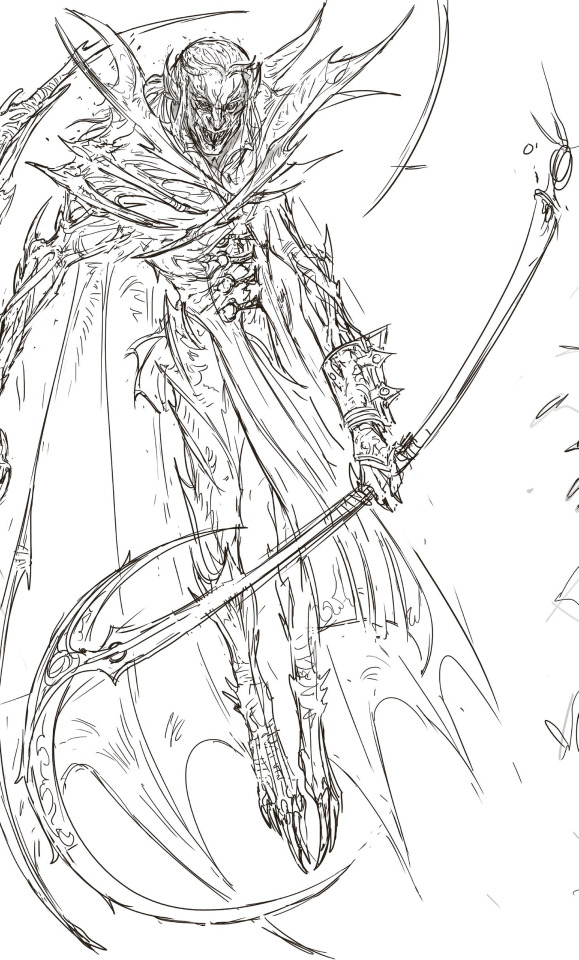

is that what he originally was supposed to look like?!the scythe...ugh it looks so cool
the other interesting thing is apparently other spawns were somehow okay/happy with their situation

the other thing i wanted to mention is i think Cazador was originally supposed to be a half elf,the language Cazador uses is Kozakuran,The Kozakurans were a human ethnicity
The Creche vs The Cult of the Absolute
(source)
there was supposed to be a fight between the absolute cultist(led by Orin and the butcher)vs the creche(and some sort of team up between lathander priests and githyanki)

you could side with the absolute,they wanted to stop Kith'rak Voss from returning to Vlaakith,here's some of the butcher's lines


and orin's


and this orin badass moment,i'm still salty they cut this for the full release...



or you could side with Voss and helped him escape(i suggest you watch the source video,there's so much more there)
some other stuff
there was some datamined stuff bout the city here and here
i don't get it...why did they change so many good stuff,Ethel's nephew and hag coven,Raphael's original deals,Zevlor plot twist and...are all gone
at first i thought they"cut"those content due to time restriction or resource constraints but that's clearly not the case,There is a clear change in direction,i think what they were originally going for was"choosing the lesser of two evils"then they decided to go with more generic route of good vs evil!
bg3 was released in August 2023,larian was looking for beta testers for Acts 2 & 3 in july 2022 idk maybe if they didn't rewrite the companions to be less mean/evil and didn't add halsin and dark urge they could have finish the game?!
#bg3#baldur's gate 3#ketheric thorm#bg3 ketheric#isobel thorm#dame aylin#cazador szarr#bg3 cazador#astarion#astarion ancunin#orin the red#bg3 orin#bg3 critical#larian critical#Kith'rak Voss#bg3 meta#can't they just release or sell that beta version of acts 2 & 3?!#ugh#sorry for the rant#i was half asleep when i wrote this
918 notes
·
View notes
Text
Some Professor Widogast thoughts:
So, you know about how weird it is to see a teacher outside of a school setting? That’d definitely be a thing with the Academy students, but at least for most of the Professors it was at normal places like the market or at Balls or whatever. Not Caleb, though, or well yess also then but also other times.
Like you’re a fancy rich kid, you go to fancy wizard school, and you’re doing a rebellion by sneaking out to this underground club with these crazy new age bards and a bar and a fight ring. You feel so badass and then you get there and your Transmutation 101 teacher is there, drunk, getting playfully grinded on the left and right by a purple tiefling and a married halfling that’s husband is dancing on her- and you just leave. Just right away. You don’t even have time to notice Expositor Lionnet trying to get to second base with her wife right behind them.
One student is from a prominent land owner in the Zemni Fields, their family goes to Blumnethal’s festivals to set up stands to sell wares and have a good time. They go to a fight pit that they hear is really cool, they have a keg stand and everything, and they get there and their teacher who’s pushing 40 and teaches their ‘Advanced Components 205’ every Wednesday is doing a keg stand, being held upside down by a blue tiefling and a half orc dressed like they stepped out of smut book with a sea theme, while two scary looking lesbians and and Halfling in sundress cheer him on. And when they let him down, the whole group immediately jumps into the fighting ring and destroy the competition even though the Halfling looks like they are too drunk to see and none of them are in decent gear. The group gets bored right away, start a three way shoulder war/chicken fight, which goes to hell right way because they all try to cheat. The Monk has their Professor in some sort of leg lock when the student’s father drags them out.
A student’s family goes on summer vacation to Nicodranas. To their horror, they find out that Professor Widogast and his friends don’t believe in bathing suits when they go to the beach.
The best part? Everytime something like this happens, nobody believes it.
643 notes
·
View notes
Text
a lot of people have already pointed out how totk has a lot of themes of imperialism and generally leans conservative ideologically, but what i think is interesting is how totk subtly redefines what a “researcher” is.
zelda wants to be a researcher in botw, and what this means in the context of botw is largely someone who works with sheikah technology. she wants to figure out ancient sheikah tech, she has an interest in botany and otherwise nature and biology (the whole silent princess and the frog thing), robbie and purah, the two characters who are the closest to us seeing what a researcher in the context of botw is are basically inventors. in totk, however, the main researchers who are presented to us are all historians.
this is an interesting pivot, because in botw zelda is not really interested in history. if anything, the one who’s deeply concerned with history is rhoam, wanting to preserve historical tradition and his uncritical reliance on said tradition and historical precedent is what leads them to their doom. in botw, zelda is narratively opposed to history, if anything, all the ancient tech backfires on them and traditions fail to awaken zelda’s power. zelda’s urge to be a researcher is in wanting to understand the world around her, not just blindly follow ancient plans but rather have agency within them.
totk, however, is obsessed with ancient plans. the only real moment where zelda gets to geek out in totk is her getting all giddy about finding out more about the divine origins of hyrule. all the researchers in the game are concerned with finding out more about the zonai. since all the mentions of ancient sheikah technology are scrubbed from the game purah and robbie read more as strange outliers, the sheikah slate is no longer, now it’s the purah pad, a product of purah rather than something larger. the whole game is literally about following an ancient plan, a plan most characters don’t fully understand as they sign up for it. totk’s main story is built on confusion, on the characters not knowing what’s fully going on but having faith in ancient sages telling them what to do. in botw, following ancient plans you don’t fully understand was the thing that doomed you. in totk, following ancient plans you don’t fully understand is the gimmick.
that juxtaposition between the two games has an ideological through line: botw posits that progress is necessary. mindlessly relying on tradition doesn’t work. prophecies are omens, not instructions. history must be learnt from, not repeated. the ancient sheikah aren’t a group to be emulated, but rather to be learnt from, considering their machinery backfired and the royal family betrayed them. totk, however, is obsessed with the mythical history of hyrule, a time where everything was idyllic until one bad man showed up, a time we must emulate in order to win. i already talked about how the past in totk is zelda’s life pre calamity but better here, but that also plays into the idolisation of that era and its royalty. in botw, even the myth of the first calamity preserves the fact that the yiga clan has origins in the royal’s family persecution of the sheikah, even the time when they successfully held back the calamity is tinged with mistakes that still affect the world ten thousand years later. in totk, ganondorf’s origins are nebulous. nobody provoked him, nobody did anything wrong, he’s just evil because he is.
a lot of right wing ideologies are hinged on preservation, but more than that: the belief in the nebulous mythical past in which everything was better. “make america great again”, the fascist’s idolisation of ancient rome which is represented largely inaccurately, look at any conservative rhetoric and you’ll see people complaining about how things nowadays are ruined or are being ruined, how in the past things were this way and they’re not anymore, which is bad. the belief in the fact that in some past period we were great and are not anymore, and the strive to emulate that past is a trait highly typical of right wing ideologies. and in totk the past as a great era is an idea presented completely uncritically, the narrative is entirely controlled by the game and doesn’t dwell on any of the inconsistencies in this idea.
now, obviously, not every story in which a great ancient era exists is fascist, right wing or conservative. but to me what’s interesting specifically in totk is this shift between the two games: botw is critical of the past. it’s critical of arrogantly repeating history, it’s critical of having blind faith in great relics of the past. totk isn’t. totk idolizes the past, totk tells legends and tells you to believe them without any doubts. botw believes researchers are those who seek to understand the world, innovate it and solve problems without relying on ancient ways. totk believes researchers are those who discover ancient instructions, ancient ways and relay them to great men in the present to be followed. the four mainline regional quests in botw are about discovering four ancient relics that are terrorising the land and fixing the mistakes of the past. the four mainline regional quests in totk are about discovering four ancient legends are true, and receiving instructions from an ancient sage on what to do.
totk is not simply neutral, it is ideologically conservative in stark contrast to botw, because of the things it chooses to leave uncriticised, notably the things botw was very poignant about examining critically. the way totk redefines what is a researcher is indicative of this, indicative of the way it chooses to idolize or present as an unexamined good that which was nuanced in botw. totk isn’t just conservative in the sense that it presents uncritically a “good king” and “evil conquerer”, it goes deeper, it’s notable because botw was starkly opposed to the thematic axioms totk presents.
i just think it’s very interesting that they made a sequel to botw, and completely redefined or otherwise ignored botw’s thematic core.
#totk critical#loz#botw#totk#legend of zelda#tears of the kingdom#breath of the wild#meta#analysis#my hot takes
2K notes
·
View notes
Text
Going to throw my hat into the “Liliana sucks” arena with this piping hot take: She doesn’t really love Imogen.
She loves the idealized version of Imogen she’s built in her head over 25 years of absolutely no contact with her. She loves the innocent little girl that needs her mommy to protect her from the big bad gods. She loves the daughter who will be grateful to her for all the hard decisions she had to make.
Her denial and self-absorption were enough to protect that ideal of her daughter from actual Imogen begging her to reconsider; she could tell herself that Imogen just didn’t understand what was at stake, or why these hard decisions had to be made.
But Imogen finally crossed a line that Liliana couldn’t reconcile with her idealized little girl, and that’s why Liliana broke so dramatically. Her “daughter” is dead, replaced with a hardened adventurer who’s willing to make her own hard decisions, and isn’t going to thank Liliana for the carnage she and Ludinus have left in their wake.
733 notes
·
View notes
Text
wait wait wait guys have you ever thought about how the Mighty Nein are everything they shouldn’t be upon first glance
no no guys guys listen to me they’re all the antithesis of what they’re meant to be and that’s why they’re such amazing and heartfelt characters
like, Caleb is a wizard who’s afraid of his own fire magic. his own power causes him to falter in battle. his strongest spells are his most dangerous to himself. wizards are supposed to be prideful of their magic, but Caleb’s is the reason he hates himself
Beau is a monk who never wanted to be. her job is one that people normally associate with being calm and collected and Beau was a wild rebellious kid who got dragged into this line of work against her will. she never wanted to be this!! but now she is and she’s gotta deal with it!!
Fjord is a warlock who never wanted power from his pact, which is why you’d think a warlock would make their pact at all. but no. Fjord made his pact because he wanted to live, not because he wanted power. he was a scared orphan who hated his tusks, not a buff, muscled, angry half-orc like people assumed
Nott is NOT, that’s the whole crux of her narrative! she wasn’t pretty, like a halfling girl was supposed to be. she wasn’t a goblin, she was just transformed into one. and not only that, but despite being a three-foot-tall alcoholic kleptomaniac, she’s the mom of the group!
Jester is a Cleric whose god isn’t actually a god and who would much rather bash bad guys over the head with her lollipop than have to stop and heal her friends!! she’s a bubbly, optimistic ray-of-sunshine, but you know when she says she’s gonna change the world with friendship she means it as a threat
Mollymauk is an amnesiac, but he doesn’t want to remember who he was. if you ask him, that wasn’t him! he might be a flirtatious hedonistic carnie, but he’s also single-mindedly devoted to making the world a better and more loved place than it was when he found it. he’s a liar, but he means well. he’s an arrogant fool, yes, but he’s right! he did it! he left it better!
Caduceus seems like he’d be creepy and grim from growing up in a graveyard, but he’s actually the most chill out of the entire Nein by far. he’s calm, he’s sweet, and he’s comforting, more than anything else. you’d think he’d be amazed by seeing the outside world for the first time, but he spends the whole time knowing that one day he’ll return home, that he wasn’t supposed to be the one to leave
Yasha is a barbarian with skeletal wings and a dramatic, monochromatic look, but she’s a complete sweetheart. she’s Molly’s best friend, she was a carnival bouncer, she’s a lesbian disaster who collects pressed flowers in a book out of love for the wife she lost. those black wings were actually hiding soft white feathers
Essek was born straight into the den of politics, he was a spymaster, he literally started a war for his own gain, and yet. he’s sounds irredeemable on paper, but. he’s not!! sure, the Nein kind of have to drag his alignment kicking and screaming into neutral, but they manage it. Essek learns and grows and he overcomes his nature. he becomes good, against all odds
guys guys guys don’t you see it!! look at them!!they’re such compelling characters!! they’re everything they’re not supposed to be!! dude y’all how didn’t I realize this earlier!! they subvert their narratives in the most interesting ways ever and I justhshsbhshshsjnsmshsnhsfn!!
#having very normal thoughts about the hyperfixation before bed as you can see#god I love the Mighty Nein#I swear to god their story is one of the best things I’ve ever discovered#it just#it just screams ‘you can be more than what the world made you to be’#‘you can be more than you once were’#‘you can live and grow and love and it can be so so amazing. just let yourself have it’#the Mighty Nein’s story is one of such overwhelming hope and love for the world and I just#*distant sobbing* /pos#the mighty nein#critical role campaign 2 spoilers#critical role#cr c2#caleb widogast#beauregard lionett#fjord stone#nott the brave#veth brenatto#jester lavorre#mollymauk tealeaf#caduceus clay#yasha nydoorin#essek thelyss#cr meta
728 notes
·
View notes
Text

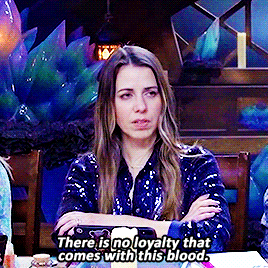
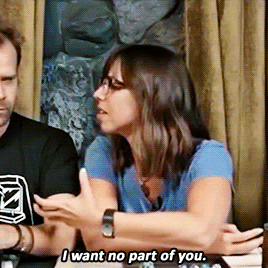
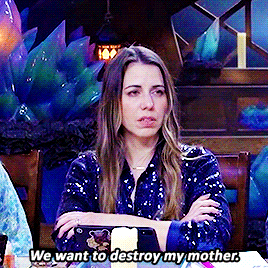
C1E60 || C3E88
#critical role#criticalroleedit#vex'ahlia#imogen temult#laura bailey#gifs#*#*cr#*parallel#cr1#cr3#vex'ahlia cr#syldor vessar#liliana temult#r: vex x imogen#angst tag#nova shh#cr meta#47m c1e60#3h12m c3e88#laura bailey said it's all about the blood of you mixed into the blood of me whether i like it or not and what does that mean#because it certainly doesn't seem to mean that you love me.#and how can i love you when you were supposed to raise me and protect me and care for me and you didn't#how can i love you when you were supposed to teach me what love is and instead you only taught me hate and loneliness#and why is there a part of me that still desperately hopes that you do love me? that you could bring yourself to love me?#and then the part that makes me go even more batshit crazy: THEY HAVE /MET/ EACH OTHER. THESE TWO WOMEN HAVE M E T#*SCREAMS FOR SEVEN THOUSAND HOURS STRAIGHT*
807 notes
·
View notes
Text

BG3 Narrative Changes Post-Full Release
An update on the project I have been working on over the past weeks, to compile a record of all the narrative changes Larian has made to Baldur's Gate 3 post-Full Release — particularly those changes that have affected characterization. There are many of these changes that are not common knowledge, even among dedicated fans, simply due to the size of the game and the varied narrative pathways one can take.
As stated in my original post, this is a neutral project not meant to be either inherently supportive or critical of said changes, but merely to act as a record and reference for those who would like to be aware of them. Particularly with new fans always entering the fandom, I want them to be able to understand aspects of the story that are no longer present in the game, but might still be referenced and impactful to fandom discussions.
I will continue to update the log as I receive new submissions via the report form, and have the opportunity to verify to the best of my ability that the material in question was truly changed, as opposed to potentially bugged in some playthroughs, etc. If you are aware of any changes that you do not see on the spreadsheet, please submit a report form, as I am only one person, and cannot happen across all of the potential changes – especially with so many unannounced – on my own.
#as always if you have any questions or comments i would be happy to hear them#and would be very grateful for any help in spreading this around#voidling speaks#bg3#fandom#larian#baldur's gate 3#astarion#halsin#wyll ravenguard#bg3 raphael#gale dekarios#enver gortash#meta#resource#larian critical#<- for archival purposes (as stated above - not intended as inherently critical)#bg3 spoilers
933 notes
·
View notes
Text
It's been a while since I watched Supernatural, so don't take my opinions as gospel or anything. But I think Dean is self-hating to the point of narcissism in some ways. Don't get me wrong, I empathise with Dean and understand why fans largely do too. But his self-loathing warps his perception and becomes the centre of EVERYTHING and at times that really has ripple effects on those around him - particularly Sam.
Take their childhood, Sam has a right to mourn the fact that he didn't get a normal childhood. He's allowed to be angry that he didn't get a home, a present father, a stable community, and consistent education. But whenever Sam attempts to express his complicated feelings about his childhood, Dean immediately interprets it as ' oh I was supposed to look out for you. Are you saying I failed? Are you confirming I'm worthless?' which grinds the conversation to a complete halt. Because of Dean's intense self-criticism, Sam can never really be 100% honest with him or ask for support with his own issues, especially regarding their childhood. As anything outside of 100% gratitude just becomes another stick for Dean to beat himself with, and the conversation is immediately derailed.
Not only does Deans self-hatred mean that Sam's expression of his own experiences are pretty consistently shut down. In some ways, I think Dean strips Sam of his autonomy - he's so self-loathing, he sees every decision Sam makes as being about/a reaction to him. A good example of this is Stanford. Rather than understanding Stanford for what it was, an attempt by Sam to carve out a better life from himself and escape hunting. Dean views it as betrayal or abandonment, some re-affirmation of his own belief that he's not worth caring about. Rather than understanding it's a rejection of hunting, he sees it as Sam rejecting him. To Dean, Sam isn't attempting to find a better life, he's punishing the family.
Overall, it's interesting that people largely and rightfully sympathise with Dean due to his self-hatred. However, I don't see as much discussion about how his self-hatred doesn't just hurt him, it hurts those he's close to, as it colours his interpretation of their every action. Dean's self-loathing is always the biggest thing in the room and that has consequences.
616 notes
·
View notes
Text
The “What if Dooku Trains Obi-Wan instead of Qui-Gon AU” is genuinely precious to me and I think they would thrive.
Still, can you imagine how much initial adjustment it take be for Obi-Wan “Qui-Gon Isn’t Following The Rules and It’s Giving Me a Stomach Ache” Kenobi to be trained by the guy Qui-Gon learned that from?
A typical Master Dooku mission canon example from Dooku: Jedi Lost
Dooku: the mission is called Space Nascar and we have to do a shot everytime someone pisses me off
Dooku: see the Council assigns me these sorts of elbow-rubbing rich people event missions because of my “good” “stable” personality
Dooku: for example I’ve almost gotten in two separate fights and we’ve been here five minutes
Dooku: Now let’s go steal a speeder, I just Force-threw a cop
Qui-Gon is rattled by this. QUI-GON JINN.
On the other hand, Obi-Wan’s existing partnerships prove he’s able to thrive under chaos. Dooku, for all his faults, seems to have the singular ability as a Master to produce incredibly self-confident students. He’s repeatedly established as someone who genuinely loves teaching and is a natural at it, who is at their best when part of a Master Padawan partnership - which seemed to be a struggle for Qui-Gon. Ultimately he and Obi-Wan built a loving, successful partnership, but in every timeline it seems to have been initially rocky and took years to flourish. The difference in Obi-Wan having a Master who is tremendously engaged and invested in him from the get-go, but also deeply chaotic?
Makashi Chaos Monster Obi-Wan. Oh no, he’s a duelist just like his dad and bitchier than ever! The part of him that is inclined to say things like “Sith Lords are our Specialty” is given room to grow and thrive. His monologues increase tenfold and he has a lightsaber form where they’re built right in. The quips! The amount of leaving a conversation that’s going badly by jumping out a window (pulling a Dooku)!
It’s so beautiful. 🥲
#dooku#obi wan kenobi#star wars meta#qui gon jinn#this is not qui-gon critical btw I think him not being a natural teacher but blooming into one over their partnership is truly beautiful#dooku was probably a fucking mess the first few years of training rael#disaster lineage
786 notes
·
View notes
Text
okay the other thing is like. can we think about why, in-universe and out, one might choose to have the doctor return to a fan favorite regeneration and a regeneration where both the character and actor were reluctant to move on? and (especially in the context of new who being about the doctor's trauma) can we think about why one might then bring in the new exciting regeneration and have that regeneration extend comfort to the prior one?
like people keep treating it like tennant and gatwa are like. competing. but it's not a competition, it's a collaboration. it's a meeting of old and new, it's a passing of the torch. and it's honestly really really beautiful to me.
#doctor who#dw spoilers#fourteenth doctor#fifteenth doctor#meta#discourse#rtd era 2#i'm not saying there's like. no room for criticism and i'm not saying everything was executed perfectly or anything#and i think it's fair to look at it and be like 'i don't like that' or 'that wasn't executed very well'#but i also feel like some people are seeing what they expect to see if that makes sense#i don't know if you just think about it as a physical manifestation of a system moment it makes perfect sense. hope this helps
920 notes
·
View notes
Text
Zutara, romance novels, and the female gaze
Okay so I’ve been thinking about the female gaze a LOT so I checked out a subreddit about romance novels, despite never having read one. I came across this meme (which was initially a Tumblr post and then got posted to Instagram and then to Reddit and I’m now bringing back to Tumblr — Internet telephone, pls never change):
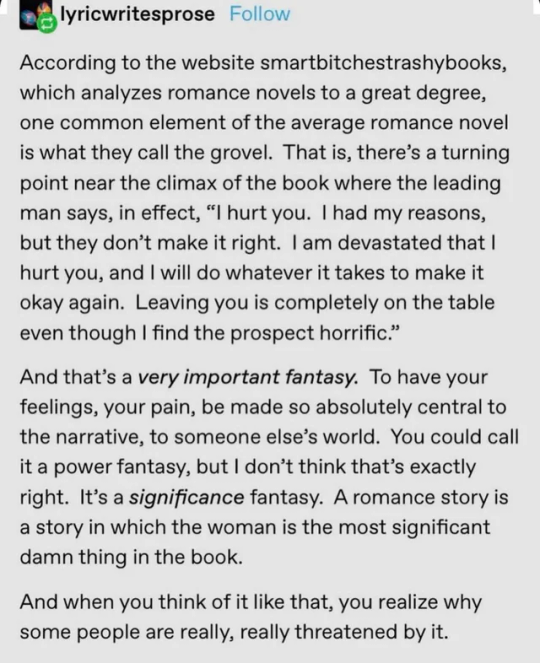
And…what is The Southern Raiders, if not a platonic grovel? Katara’s pain is central to the episode. It’s central to Zuko. Zuko asks Katara what he can do to make up for his betrayal; she demands the impossible. He reads between the lines, cockblocks her brother to get the necessary information, and then waits outside her door overnight (which he also did for Iroh, the one person we know for sure he loves). He basically makes himself a receptacle for her rage, and he holds space for her by coming with her on her revenge quest and carrying their bags and not saying a damn thing about what she should and should not do beyond like…asking her to rest. And obviously the grovel works! She forgives him and then they’re thick as thieves, bantering and fighting and saving each other’s lives, etc.
On a different note, I’ve been told that enemies to lovers is one of the biggest tropes in romance novels, similar to YA lit and fanfic. Here’s something else I found in the romance novel discourse:
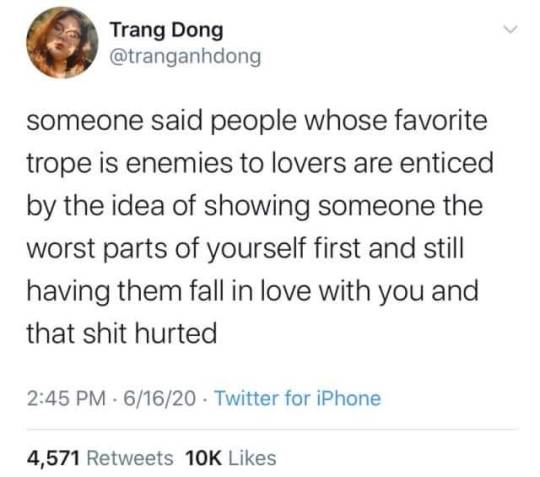
And…yeah. In TSR, Katara really does show Zuko her worst self, because she doesn’t feel the need to perform for him. She doesn’t feel the need to perform moral perfection OR cold blooded vengeance. She bloodbends in front of him and he just goes with it. She doesn’t kill Yon Rha and he just goes with it. He doesn’t treat her any differently afterwards. Maybe they talk about it off screen, but I kind of like the idea that they don’t, because Katara doesn’t need to explain anything.
And it’s so interesting, because some people in the ATLA fandom have a totally different read on TSR. They think Zuko was encouraging Katara to get revenge (by what, keeping his mouth shut?), and that Aang is the one who acts as her moral compass. I believe that either Bryan or Mike said in the DVD commentary that Aang is the angel on her shoulder the entire time. And this interpretation does make sense if you see it from the male gaze, where Katara as an object of affection is acting in an angry, irrational, threatening way. But if you see it from the female gaze, you recognize that actually it’s probably the most emotionally taxing experience Katara has to go through, and she doesn’t owe it to be nice or perfect to anybody. Katara’s formative trauma literally comes to a head, and she has to make a decision — no, a discovery — about who she is in relation to the tragedy that defines her life and even her identity (as a waterbender, as a parentified child who becomes the mom friend, as a genocide victim), and she’s accompanied by someone who trusts her judgement and validates her feelings.
I’m not saying TSR is explicitly romantically coded, but when it conforms so well to romance novel tropes…is it any wonder that so many people thought “yes this is her man?” And then he takes lightning in the heart for her and reaches for her when he’s literally dying, I will never be normal about that either
#Zutara#Katara#Zuko#the southern raiders#Pro zutara#anti Bryke#I guess#I swear I’m not a Bryke anti but I feel like they just don’t get#The female gaze#and the fact that Zutara is so female gaze is kind of an accident and I find that fascinating#atla fandom critical#The southern raiders turned me into a Zutara shipper#one ep away from the finale#Zutara meta#My meta
1K notes
·
View notes
Text
sam's character, veth, put the core in devexian, and powered him up, and so the first aeormaton since the fall of aeor awoke.
devexian made sure fcg, sam's character, was able to be awoken as he was.
and fcg, using the core inside him, utilized it to save his friends once and for all.
the cycles of this game....
#critical role#cr spoilers#critical role meta#robots#fcg#devexian#sam riegel#van speaks#campaign 3#aeor#veth brenatto#campaign 2
483 notes
·
View notes